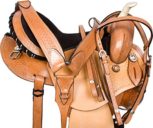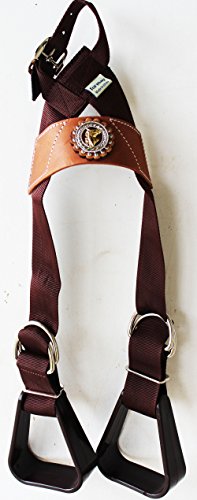[ad_1]
At a time younger people are moving away from agriculture, Austen Samet-Brown is bucking the trend. She wasn’t born into a farming or ranching family or even Wyoming.
Samet-Brown grew up in Petaluma, California, in the wine country of Sonoma and Napa valleys. She took some interest in agriculture early on. A childhood friend’s dad owned a dairy, and she worked on it during the summer. She helped the friend raise replacement heifers for 4-H and showed horses in the program.
Horses are her true love, though, and she found her calling through a friend who was taking horseback riding lessons.
“I was so jealous,” Samet-Brown recalled.
She was about 10 years old at the time and begged her parents to let her take riding lessons. After a couple years of weekly lessons, Samet-Brown started leasing her trainer’s horse to go to horse shows. In her senior year in high school, her parents gave her a choice: She could either get a horse or a car.
However, the tenacious teenager pointed out that it wouldn’t do her a lot of good to have a horse if she didn’t have a car to go see it. With some financial help from her grandmother, she got her first horse — and her first car.
Dressage
Today, Samet-Brown owns seven horses and is vice president of the Heart Mountain Dressage Club. Dressage, which is an English discipline, is quite a bit different from the rodeo cowboy styles that are so much a part of the culture here. Rather than Wranglers and cowboy boots, dressage riders dress in traditional jackets and white breeches. Their saddle is smaller than those used in rodeo, and it sits upon a white saddle pad.
There is a form of dressage that melds western horsemanship with English dressage, called western dressage, and the Heart Mountain Dressage Club offers all western dressage classes.
Dressage competitions are rated on a formalized sequence of movements.
“It’s like dancing with your horse,” Samet-Brown explained. “You and the horse have to be in sync.”
Samet-Brown also does eventing, and one phase of that is jumping.
“Eventing is like the horse version of a triathlon. It consists of three events or three phases: stadium jumping, cross country jumping, and dressage.”
In traditional dressage tests, there is no jumping, Samet-Brown explained, and the training and physical demands for dressage and jumping are very different. However, the two go hand-in-hand.
“Some compete in each sport individually and those that event will dabble and train for both,” Samet-Brown said. “Many dressage riders believe that ‘cross-training’ with small jumps and cavalittes is very beneficial for a well rounded dressage horse, and many jumpers believe that the best horses are trained with a solid dressage foundation.”
The Heart Mountain Dressage Club isn’t well known in the area, but Samet-Brown said it has about 40 members. They do three shows per year: one in Cody, one in Lovell, and one in Powell. They also hold a number of clinics throughout the year. The big competitions, though, are primarily in Montana and Colorado.
Samet-Brown said it took a lot of practice for her to get to the point she does well in the competitions.
“I got out there and rode the difficult horses and learned by training young horses, through trial and error,” she said. “And I have had a few good mentors/trainers in my life that I watched and who taught me their skills and techniques.”
Looking for adventure
With her love of horses, Samet-Brown’s first instinct when she planned her college studies was to go into animal science. Caring for horses is an expensive hobby, so there was always a concern about how much her career would pay.
With animal science, the best way to make money is by becoming a veterinarian. That was going to take eight years of college and a lot of student debt.
“When I looked at the whole process, the amount of schooling and debt just wasn’t what I wanted to do,” Samet-Brown said.
She wanted to work outdoors — working in a cubicle wasn’t for her — so she decided her best bet was to go into agriculture. She studied crop and soil science at Oregon State University. After completing her bachelor’s of applied science at OSU, she served in the Army National Guard. During that time, she met a boy who happened to be from Powell and came out to visit on a whim. While the boyfriend didn’t last, the friendly little town left an impression on Samet-Brown. She stuck around and eventually met her husband, John Brown. Today, they have a 4-year-old son, Bjorn.
“[I was] looking for adventure and new experiences and am half-surprised myself that I decided to stay to build a family,” Samet-Brown said.
At first she wasn’t sure what to do for work. She wasn’t born into a farming family, so that limited her options; the economics of farming just don’t lend itself much to startups.
“I can’t just go out, buy land, and become a farmer,” Samet-Brown said.
She fell into a few odd jobs. For a couple weeks, she drove a truck for a local farmer. She also worked at the cooperative and a bean company. To make extra money, she exercised horses in the evenings and sometimes during her lunch break.
Starting a career
In 2014, Samet-Brown pursued a master’s in agronomy and crop science at the University of Wyoming, completing the degree in 2016. During this time she worked at UW’s Powell Research and Extension Center (PREC).
Samet-Brown said her knowledge of agriculture has come as much from the jobs she’s had as the classes she’s taken.
“I value education, but nearly all that I have learned regarding agriculture and my job has come from experiencing it and learning as I go,” she said.
At PREC is the seed laboratory, which analyzes seed samples as part of the certification process. Samet-Brown was familiar with the lab from working at the bean company. When the lab needed another analyst, she snapped up the opportunity.
Becoming a certified seed analyst is a long process, requiring a couple years of work and a series of tests. She’s about a year-and-a-half into that process.
While many people moving to Powell are retirees, Samet-Brown is showing that it’s possible to build a family and grow a career here.
“I definitely have had some incredible luck with my career and the opportunity for continued education here in this area,” she said.
Let’s block ads! (Why?)
[ad_2]
Source link






Comments
Comments are disabled for this post.